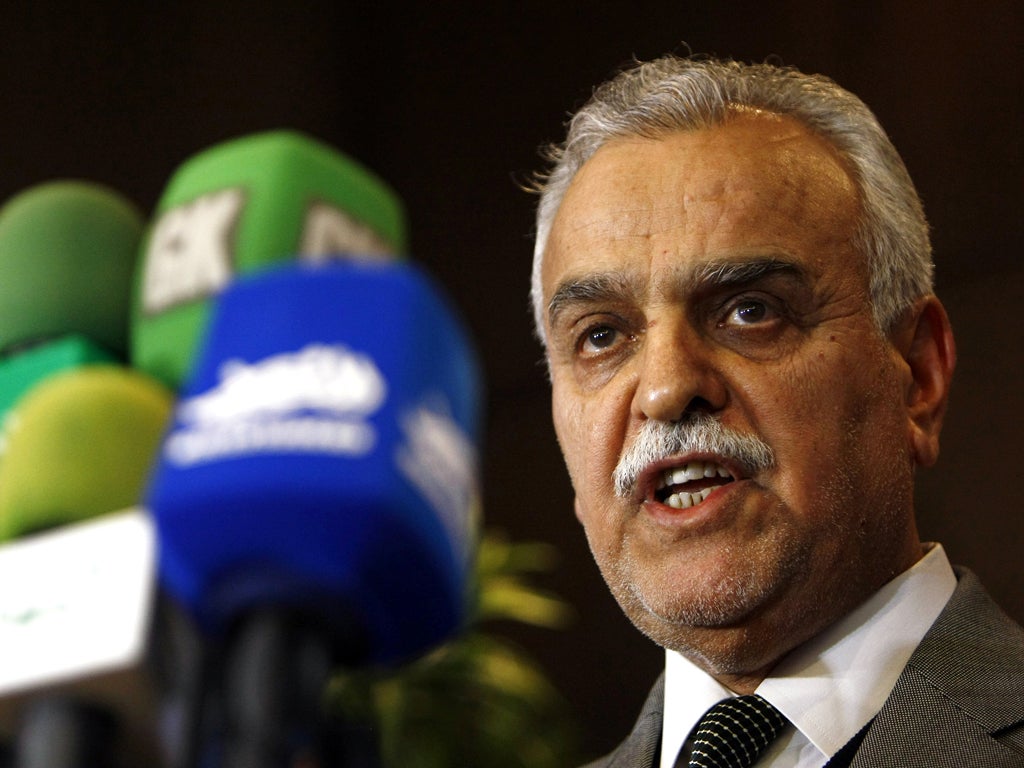Blasts in Baghdad scupper talks to resolve Iraq crisis
Sunni Vice-President accuses Shia Prime Minister of 'acting like Saddam Hussein'

Iraq is edging closer to an all-out confrontation between Shia and Sunni as talks aimed at resolving the political crisis were cancelled yesterday.
The Sunni Vice-President, Tariq al-Hashemi, who has taken refuge in Kurdistan after being charged with running a death squad, accused the Shia Prime Minister, Nouri al-Maliki, of acting like Saddam Hussein and is demanding his replacement.
"The problem is that nobody can retreat without loss of face, so compromise is very difficult," said Ghassan al-Atiyyah, an Iraqi political expert. "Maliki is a risk taker and has put all his chips on the table so he needs to come out of this crisis with something."
As the dispute escalates, there were demonstrations in support of Mr Hashemi after Friday prayers in Sunni cities such as Samarra, Ramadi and Qaim. Sunni preachers accused Mr Maliki of fomenting sectarian conflict. Sunni leaders in Baghdad said privately that they have little left to lose and are sending their families out of the capital for their own safety. Local militias in Sunni-majority provinces are reported to be seeking weapons and organising to resist a government crackdown. Sources close to Mr Maliki say he may have decided to try to resolve the crisis by force, seeking to repeat his success in defeating the Shia Mehdi Army militia in 2008.
The sense of impending disaster was increased by the wave of bomb attacks in Baghdad on Thursday that killed 72 people and injured more than 200. A meeting of political leaders from all sides called by parliament for yesterday in the wake of the bombings was cancelled because of the continuing violence and objections by Mr Maliki's mainly Shia National Alliance grouping to the boycotting of parliament by Mr Hashemi's largely Sunni al-Iraqiya bloc.
Mr Hashemi told Foreign Policy magazine that "many of Saddam's behaviours are now being exercised by Maliki, unfortunately. The judicial system is really in his pocket." Another Sunni Iraqiya leader, the Deputy Prime Minister, Saleh al-Mutlaq, whom Mr Maliki is trying to dismiss, also said the government was a "dictatorship" and Mr Maliki "worse than Saddam Hussein".
Mr Maliki is in control of the all security agencies, including the army and police, in Iraq, but he would still have difficulty in enforcing his rule over the Sunni provinces. Both sides can look for support from allies abroad, the Sunni seeking backing from Saudi Arabia and Turkey, and the Shia from Iran. It is not clear how far governments in these countries want a confrontation in Iraq at this stage. When Mr Maliki successfully clamped down against the Mehdi Army in Basra and Baghdad in 2008 he had the military support of the US and his government was backed by Iran.
The US ability to mediate an end to the current crisis has been reduced by the withdrawal of the last American troops on 18 December. The Kurds, who have their own state-within-a-state in northern Iraq, will try to mediate, but have said they will not hand over Mr Hashemi who has sought refuge in their capital Arbil.
It is not in their interests to see Mr Maliki triumph over the Sunni leaders since they might be his next target. They are also wary of the collapse of the power-sharing agreements reached since the fall of Saddam Hussein in 2003.
Subscribe to Independent Premium to bookmark this article
Want to bookmark your favourite articles and stories to read or reference later? Start your Independent Premium subscription today.

Join our commenting forum
Join thought-provoking conversations, follow other Independent readers and see their replies